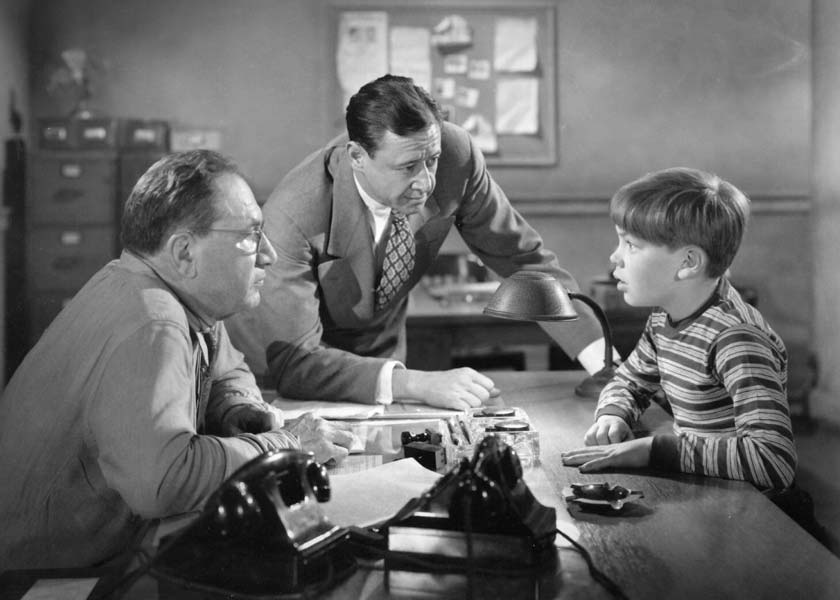Synopsis
Tommy Woodry (Driscoll) invents stories about himself and his family that he tells his playmates and his parents, Mary (Hale) and Ed Woodry (Kennedy). His story about his family moving to Texas prompts the landlord to attempt to rent his family's apartment. His parents, concerned about his inability to stop lying, send him to his room after dinner. The night is hot, and Tommy is allowed to sleep on the fire escape landing. The landing outside Jean (Roman) and Joe Kellerson's (Stewart) apartment on the upper floor has a breeze, and he moves his pillow up there. Later in the night, he hears noises in the Kellerson's apartment and peeks through the crack below the window shade. He sees Joe Kellerson and a sailor fighting, and Mrs. Kellerson stab the sailor with a scissors. Tommy runs down to his floor before the couple remove the sailor's body through the window and carries it away to hide it. He tells his parents about seeing the murder, but they do not believe him. He goes to the police station to tell his story, but the police detectives also do not believe him. A detective takes him home and tells his mother about his story. Angry, his mother says he made it up. His mother takes him upstairs to apologize to Mrs. Kellerson for making up a story about her. Tommy is frightened now that the neighbors know he saw something.
After his mother leaves to visit her sick sister and his father goes to work, Tommy is alone. He starts to run away, but his father returns and locks him in his room. Joe Kellerson breaks into the apartment, and the terrified Tommy tells him everything he knows. He runs away from the Kellersons, but they catch him and bring him back to their apartment. Kellerson balances Tommy on the edge of the fire escape hoping he will fall off, but he gets away and runs over the roofs. The Kellersons follow and trap him in an abandoned tenement building. He finds the sailor's body in a room and screams. With Kellerson close behind, Tommy flees over loose beams. Kellerson attempts to cross a beam that Tommy is pushing. The beam slips and Kellerson falls to his death three stories below. Tommy, clinging to a loose beam, cries for help. The police and firemen find him and place a net below the beam. After hesitating, he jumps into it. As they ride away from the tenement in a police car, Tommy tells his parents that he will only tell the truth hereafter.
Discussion
This excellent film, based on the short story The Boy Cried Murder by
Cornell Woolrich, is suspenseful and engrossing. The event that initiates the
story's action, the attempted theft of the sailor in the Kellerson apartment, is
the weakest and least convincing part of the plot; the remainder of the film is
very convincing and exceptionally gripping. As with
the boy who cried 'wolf,'
Tommy's true, but improbable, story is not
believed, except by the murderers. The audience shares the boy's terror as the
desperate Kellersons stalk him. Bobby Driscoll is an outstanding child actor,
natural and unaffected. His innocent look and soulful eyes give him great screen
presence. Barbara Hale and Arthur Kennedy are first-rate as Tommy's loving, but
exasperated, parents. Hale's makeup is particularly dowdy and plain. Paul Stewart
is menacing as he pursues the child. The depiction of tenement life in Manhattan
is realistic and stark. The children live in small, rundown apartments in one
tenement and play in the broken hulk of another. The Woodrys seem contented with
their life, but they do not have much.
Cornell George Hopley-Woolrich was an American novelist and short story writer. He was born in New York City, New York, and as a child lived in South America with his father. He worked in Hollywood during the late 1920s and is credited with writing story lines and titles for several films under the pseudonym of William Irish. In 1933, Woolrich returned to New York where he lived with his mother until her death in 1957. Woolrich was a prolific writer and a recluse who rarely left his hotel room. His first published works were Jazz Age romance novels, but he is primarily famous for his many mystery stories and novels, in which everyday events go terribly wrong, and bad things happen to ordinary people. Many radio and television plays, and more than 25 films, notably Street of Chance (1942), The Chase (1946), The Window (1949) and Rear Window (1954), have been based on his work. Woolrich's greatest strength is creating suspense that grips the reader even as the plot stretches credibility.

